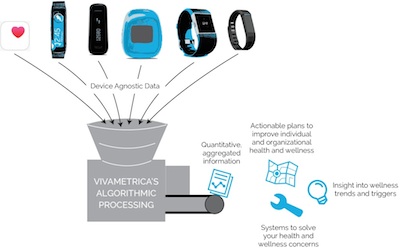 Self-tracking data from wearable devices has gradually become important to your doctors, your employer, and your health insurer. Now it seems your lawyer wants in, too.
Self-tracking data from wearable devices has gradually become important to your doctors, your employer, and your health insurer. Now it seems your lawyer wants in, too.
Vivametrica, a Canadian company that uses a device-agnostic platform to collect and analyze activity data for healthcare providers and employers, launched a new service for personal injury lawyers. Quantified data from the platform compares the client's steps per day against normal population data, to help lawyers assess clients and determine whether to take them on.
"What we’re trying to do to begin with is provide a tool for the lawyer to do an assessment of their clients earlier in the case," Dr. Robert Hu, CEO of Vivametrica, told MobiHealthNews. "Lawyers, just like other professionals, need to have a way of defining where to their clients fit in the whole scheme of things. We present this initially as a tool for the lawyer to get a sense for where their client is."
Further down the road, though, the data could also find its way into court, where the current status quo is what Hu calls a "he said-she said" of expert testimony on both sides.
"Prior to this, legal teams representing personal injury cases had to rely on subjective, personally reported data from clients," Simon Muller, a partner at McLeod Law said in a statement. "The Functional Activity Assessment closes the gap between what a client perceives and what is objectively verifiable. Our firm is now able to use this data on behalf of our clients, which we believe is a valuable asset in assessment and support of our client's claims. Now that we have access to this invaluable health data, we anticipate that it will become an expected part of our practice."
Currently, the startup is working with just one law firm with about 10 personal injury lawyers, Hu said. Three others are interested, he said, but Vivametrica wants to establish efficacy before going after a high volume of users.
Vivametrica can bring in data from a number of different wearable sensors including several Fitbit devices, Samsung Galaxy Gear and Gear Fit, and anything that feeds data into Apple's HealthKit. The normalized data with which the user's steps are compared is broken down by age, gender, body mass index and waist circumference. And although the reports are generated automatically, they're verified and reviewed by health professionals from Vivametrica.
The Calgary, Alberta-based company, which launched last year and is currently in beta testing, aims to create a crowdsourced platform for healthcare and employers that will give new meaning to the data collected by consumer activity trackers, VentureBeat reported in September. A cloud-based database will use large sets of data to create a baseline for each different activity tracker, so that different brands with varying levels of accuracy can be meaningfully compared to one another.
Of course, when even small incentives are on the line -- like employee wellness ones or virtual badges -- people have been known to try to trick activity trackers, by attaching them to their pets, for example. In this case it's not hard to imagine people doing just the opposite and attempting to move less. Hu says the system is "more of an assessment tool than a lie detector," but part of what they're working on in early pilots is figuring out how long to have clients wear the devices to get an accurate read. He said that in video surveillance studies, for instance, people's artificial movements tend to drop off after a few days.
"It’s very difficult for any of us to pretend to be what we’re not for days or weeks at a time," he said. "The value of pretending is outweighed by the desire to live in our every day lives."
This isn't the first time lawyers have looked to digital health to keep them out of court. Last month HealthLoop partnered with a malpractice insurer in California in the hopes that better patient engagement could reduce malpractice litigation against doctors. The results of that study are still pending.

















